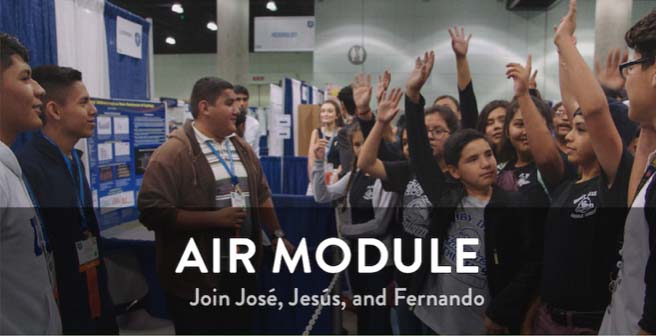Grade Level(s):
- 6-8
- 9-12
Source:
- WGBH
Resource type:
- classroom activity
Discipline:
- Earth science
Time: 10-12 class periods
Overview
This module (on the right) uses a film about students José, Jesús, and Fernando, who investigate smog in their town in Mexico, as a jumping off point for students to expand their understanding of air pollution, global warming, and the process of science.

- [What is science?: Grades 6-8] Science is ongoing; answering one scientific question frequently leads to additional questions to be investigated. (P1)
- [What is science?: Grades 9-12] Science is ongoing; answering one scientific question frequently leads to additional questions to be investigated. (P1)
- [How science works: Grades 6-8] The process of science involves observation, exploration, testing, communication, and application.
- [How science works: Grades 6-8] The real process of science is complex, iterative, and can take many different paths.
- [How science works: Grades 9-12] The real process of science is complex, iterative, and can take many different paths.
- [How science works: Grades 9-12] The process of science involves observation, exploration, testing, communication, and application.
- [The social side of science: Grades 6-8] Science depends on communication within the scientific community. (P7, P8)
- [The social side of science: Grades 6-8] Scientists usually work collaboratively. (NOS7)
- [The social side of science: Grades 6-8] The scientific community is global and diverse. (NOS7)
- [The social side of science: Grades 6-8] Anyone can participate in science.
- [The social side of science: Grades 9-12] Science depends on communication within the scientific community. (P7, P8)
- [The social side of science: Grades 9-12] Scientists usually work collaboratively. (NOS7)
- [The social side of science: Grades 9-12] The scientific community is global and diverse. (NOS7)
- [The social side of science: Grades 9-12] Scientists are influenced by their personal experiences and cultures. (NOS7)
- [The social side of science: Grades 9-12] Anyone can participate in science, but the pursuit of science as a career often requires extensive formal training.
- [Science and society: Grades 9-12] Science is embedded in, and influenced by, the broader society. (NOS7)
- [Science and society: Grades 9-12] Scientific research is often focused on topics with the potential to help meet societal needs.
- [What has science done for you lately: Grades 6-8] Science contributes to many different sorts of new technologies.
- [What has science done for you lately: Grades 6-8] Scientific knowledge helps us make decisions that affect our lives every day.
- [What has science done for you lately: Grades 6-8] Scientific knowledge informs public policies and regulations that promote our health, safety, and environmental stewardship. (NOS8)
- [What has science done for you lately: Grades 9-12] Science contributes to many different sorts of new technologies.
- [What has science done for you lately: Grades 9-12] Scientific knowledge helps us make decisions that affect our lives every day.
- [What has science done for you lately: Grades 9-12] Scientific knowledge informs public policies and regulations that promote our health, safety, and environmental stewardship.
- NOS Matrix understanding category 7. Science is a human endeavor.
- Science and Engineering Practice 1. Asking questions and defining problems
- Science and Engineering Practice 7. Engaging in argument from evidence
- Science and Engineering Practice 8. Obtaining, evaluating, and communicating information
There are currently no teaching tips for this resource.
